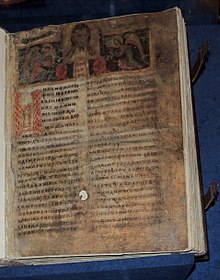The two brothers and the gold

The two brothers and the gold ( Russian Два брата и золото , Dwa brata i soloto ) is a legend by Lev Tolstoy , which was written in the late winter of 1885 and published by Posrednik in early 1886 . In 1982 the text in the 4th reader of the 10th volume Powesti und Erzählungen 1872–1886 came out in the 22-volume Tolstoy edition in the publishing house for artistic literature in Moscow .
Tolstoy took the story from the prologue of Saint Theodore, Bishop of Edessa .
content
There used to be two brothers living near Jerusalem . Athanasius and his younger brother Johannes worked free of charge for the needy. One morning, when the two had separated on the way to different workplaces, Athanasius watched after a while as Johannes stopped, stared at something on the road and - apparently - ran away in horror. Athanasius looked a little later and found a pile of gold in the grass. He built three of them - shelters for widows, orphans , infirm , poor people, pilgrims and beggars. Athanasius' self-satisfied contemplation of his completed buildings was disturbed by an angel who appeared to him: his own work was worth more than a heap of gold that the tempter had laid down. Athanasius went to himself. He looked for and then found his brother, who had run away over the mountains. From then on, both worked together in the traditional way.
German-language editions
- The two brothers and the gold. German by Arthur Luther . Pp. 155–157 in: Gisela Drohla (Ed.): Leo N. Tolstoj. All the stories. Fifth volume. Insel, Frankfurt am Main 1961 (2nd edition of the edition in eight volumes 1982)
Web links
- The text
- The two brothers and the gold in Leo Tolstoy: folk tales, fairy tales and sketches online in the Gutenberg-DE project (published by Josef Habbel, translator: Hanny Brentano )
- Wikisource Два брата и золото (Толстой) (Russian)
- online at RVB.ru (Russian)
- online at tolstoy-lit.ru (Russian)
- Entry in the list of works of folk tales (1872–1887)
- Entry at fantlab.ru (Russian)
- Lidija Opulskaja : Note on RVB.ru (Russian)
Individual evidence
- ↑ see, for example, a more easily decipherable sample from a later edition: Prologue in the middle of the 17th century (Russian)
- ↑ Russian notes (Примечания)
- ↑ Russian Л.Н. Толстой. Собрание сочинений в 22 томах, Vol. 10
- ↑ ru: Пролог (книга)
- ↑ Theodoros von Edessa , Drohla, Vol. 8 of the edition used, p. 277